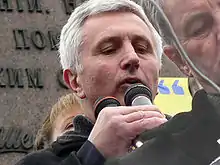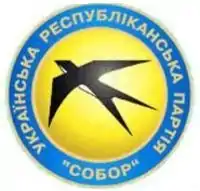Republican Platform
Republican Platform (Ukrainian: Республіканська платформа) is a political party in Ukraine. It was the first registered political party in Ukraine, created on November 5, 1990[1] by the Ministry of Justice of UkrSSR.[3] RP was founded earlier that year in place of the Ukrainian Helsinki Group in April 1990.
Republican Platform Республіканська платформа | |
|---|---|
.png.webp) | |
| Leader | Oleh Pavlyshyn |
| Founded | 1990[1][2] |
| Ideology | Liberal conservatism Civic nationalism |
| Political position | Centre-right |
| International affiliation | None |
| Colours | Blue |
| Website | |
| http://republican-platform.org/ | |


Previous names
History
November 1976 – Ukrainian community groups was established to promote the implementation of the Helsinki agreements. Almost all members of this Ukrainian Helsinki Group where subsequently repressed, four of them (V. Stus, Yu. Lytvyn, O. Tykhyi, V. Marchenko) died in Soviet camps.
March 1988 – Ukrainian Helsinki Union (UKhS) was formed. Since 1989, UKhS has moved to open propaganda activity of promoting the independence of Ukraine.
April 29–30, 1990 – Ukrainian Republican Party (URP) was established in the place of the UKhS. The party was registered on November 5, 1990 by the Ministry of Justice of the Ukrainian SSR as the first political party in Ukraine.
A 1992 split in the party resulted in the creation of the rival Ukrainian Conservative Republican Party (UKRP) led by Stepan Khmara.[5]
In the 1994 parliamentary elections the URP core party obtained nine seats initially adding three more by the end of the year.
During the 1998 Ukrainian parliamentary election the party was part (together with Congress of Ukrainian Nationalists & Ukrainian Conservative Republican Party) of the Election Bloc "National Front"[1] (Ukrainian: Виборчий блок партій «Національний фронт») which won 2,71% of the national votes[1] and 6 (single-mandate constituency) seats.[6][7] In January 2001 the "National Front" parliamentary faction had grown to 17 deputies.[6]
After being part of the National Salvation Committee[8][9] the party became part of the Yulia Tymoshenko Electoral Bloc alliance during the Ukrainian 2002 parliamentary elections.[10][11] On April 21, 2002 the party merged with the Ukrainian People's Party "Sobor" as the Ukrainian Republican Party "Sobor".[12]
| Date | Event |
|---|---|
| Spring 1999 | Creation of the All-Ukrainian Union "Open Politics" (by members of the People's Democratic Party). The main goal of the Union was the consolidation of all national-democratic forces and patriotic forces for the sake of building the Ukrainian sovereign democratic state and opposition to the re-election of the President Leonid D. Kuchma. The Chairman of the Union, Anatoliy Matviyenko.[13] |
| Summer 1999 | Statement on creation of a National Democratic Party was released on June 19 and signed by the Forward, Ukraine!, Democratic Party of Ukraine, People Movement of Ukraine (Kostenko), All-Ukrainian Union Open Politics, Liberal-Democratic Party of Ukraine |
| Fall 1999 | Declaration on creation of the united party was signed on November 10 by the All-Ukrainian Union Open Politics, parliamentary group of Liberal-Democratic Party of Ukraine, parliamentary faction of Democratic Party of Ukraine, Ukrainian Party Unity, Ukrainian Republican Party, Christian Democratic Union |
| Winter 1999 | Establishment of Ukrainian People's Party "Assembly" on December 25 (registration on March 9, 2000) based on the All-Ukrainian Union Open Politics |
| 1999 – 2000 | Along with the Ukrainian Republican Party, "Assembly" initiates the anti-presidential protest action Ukraine without Kuchma |
| Summer 2001 | Establishment of "Forum of National Salvation"[14] (later known as the Bloc of Yulia Tymoshenko)[8][9] based on Ukrainian People's Party "Assembly", Ukrainian Republican Party, Ukrainian Christian Democratic Party (later merged with Christian Democratic Union), Ukrainian Conservative Republican Party, All-Ukrainian Union "Fatherland", Ukrainian Social Democratic Party |
| Spring 2002 | Participation in the 2002 parliamentary election as part of the Bloc of Yulia Tymoshenko.[1][10][11] On April 21 "Sobor" officially merged with Ukrainian Republican Party of the same bloc into new party Ukrainian Republican Party "Sobor".[12] Into the new Ukrainian Republican Party "Sobor" was merged the Ukrainian Christian Democratic Party.[15] |
| Fall 2004 | Support for Viktor Yushchenko at the 2004 Ukrainian presidential election. As part of Bloc of Yulia Tymoshenko and Our Ukraine created pre-election coalition "Power of people" in support of Viktor Yushchenko[16] |
| 2005 – 2006 | Conflict with Levko Lukyanenko and assuming full rights on the name of Ukrainian Republican Party; Participation in the 2006 parliamentary election as part of the Our Ukraine[1] Levko Lukyanenko was forced to re-create the original Ukrainian Republican Party as Ukrainian Republican Party of Levko Lukyanenko. Both parties claimed their heritage to the original Ukrainian Republican Party (URP). |
| Fall 2007 | Participation in the 2007 parliamentary election as part of the Our Ukraine–People's Self-Defense Bloc[1] |
| Fall 2008 | Political dialog with the European Liberal Democrat and Reform Party |
| Winter 2011 | Name change to Ukrainian Platform Party[4] |
On 15 October 2012 the party withdrew itself from the national list of the 2012 Ukrainian parliamentary election.[17] In the election it did not win any constituencies (it had competed in 12 constituencies[18]) and thus failed to win parliamentary representation.[19]
In the 2014 Ukrainian parliamentary election the participated in 6 constituencies; but its candidates lost in all of them and thus the party won no parliamentary seats.[20][21]
Local elections
2010
In the 2010 local elections the party won a few representatives in 3 regional parliaments, all in Western Ukraine.[22]
Elections
| Presidential since 2004 (year links to election page) | ||||||||
|---|---|---|---|---|---|---|---|---|
| Year | Candidate | Votes | % | |||||
| 2004 | ||||||||
| 2010 | ||||||||
| Parliamentary since 2002 (year links to election page) | ||||||||
|---|---|---|---|---|---|---|---|---|
| Year | Votes | % | Mandates | Notes | ||||
| 2002 | part of Yulia Tymoshenko Bloc | |||||||
| 2006 | part of Our Ukraine | |||||||
| 2007 | part of Our Ukraine | |||||||
| 2012 | independently | |||||||
References
- (in Ukrainian) Українська республіканська партія „Собор“, Database DATA
- (in Ukrainian) Реєстр політичних партій (Register of Political Parties) Archived 2012-04-25 at the Wayback Machine, Ukrainian Ministry of Justice
- List of registered parties in Ukraine Archived 2012-08-05 at Archive.today (in Ukrainian)
- (in Ukrainian) Одна з партій НУНС перейменувалася та змінила голову, Ukrayinska Pravda (3 December 2011)
- Virtual Politics – Faking Democracy in the Post-Soviet World, Andrew Wilson, Yale University Press, 2005, ISBN 0-300-09545-7 (page 31)
- State-Building: A Comparative Study of Ukraine, Lithuania, Belarus, and Russia by Verena Fritz, Central European University Press, 2008, ISBN 9637326995 (page 353)
- (in Ukrainian) Results in consistencies, Central Election Commission of Ukraine (1998)
- About Tymoshenko Archived 2009-09-26 at the Wayback Machine, Official website of Yulia Tymoshenko
- Europa World Year Book 2, Routledge, 2004, ISBN 978-1-85743-255-8, page 4295
- (in Ukrainian) Виборчий блок політичних партій "Виборчий блок Юлії Тимошенко", Central Election Commission of Ukraine (December 22, 2001)
- (in Ukrainian) Вони – Блок Юлії Тимошенко, Ukrayinska Pravda (January 25, 2002)
- (in Ukrainian) Злилися УРП і "Собор": Матвієнко – голова партії, Лук'яненко – голова ради старійшин, Ukrayinska Pravda (April 21, 2002)
- (in Russian)/(website has automatic Google Translate option) Small biography of Anatoliy Matviyenko, LIGA
- (in Ukrainian) ТИМОШЕНКО ОЧОЛИЛА ОПОЗИЦІЮ НА ВИБОРАХ, Ukrayinska Pravda (July 10, 2001)
- Party's history. Ukrainian Republican Party website.
- Ukraine timeline, BBC News
- (in Ukrainian) Українська платформа "Собор" знімається з виборів на користь опозиційних сил, Krayina (13 October 2012)
Хто і чому змушує кандидатів зніматись з виборів? – розслідування ТВі Archived 2012-10-19 at the Wayback Machine, TVi (15 October 2012) - (in Ukrainian) Candidates, RBC Ukraine
- (in Ukrainian) Proportional votes Archived 2012-10-30 at the Wayback Machine & Constituency seats Archived 2012-11-05 at the Wayback Machine, Central Election Commission of Ukraine
- Poroshenko Bloc to have greatest number of seats in parliament Archived 2014-11-10 at the Wayback Machine, Ukrainian Television and Radio (8 November 2014)
People's Front 0.33% ahead of Poroshenko Bloc with all ballots counted in Ukraine elections – CEC, Interfax-Ukraine (8 November 2014)
Poroshenko Bloc to get 132 seats in parliament – CEC, Interfax-Ukraine (8 November 2014) - Political parties in the electoral process in the 2014 Ukrainian parliamentary election, Central Election Commission of Ukraine
- (in Ukrainian) Results of the elections, preliminary data, on interactive maps by Ukrayinska Pravda (November 8, 2010)
External links
- (in Ukrainian) Official site